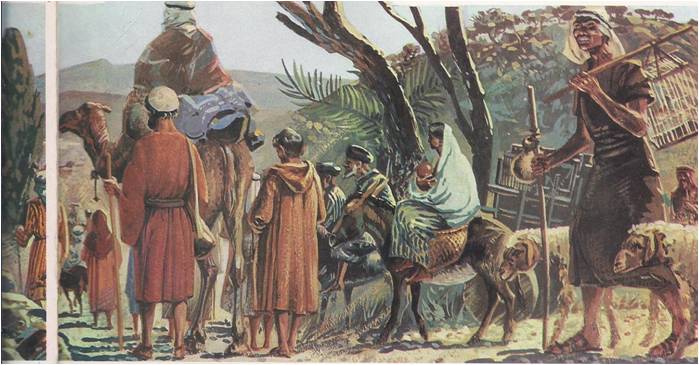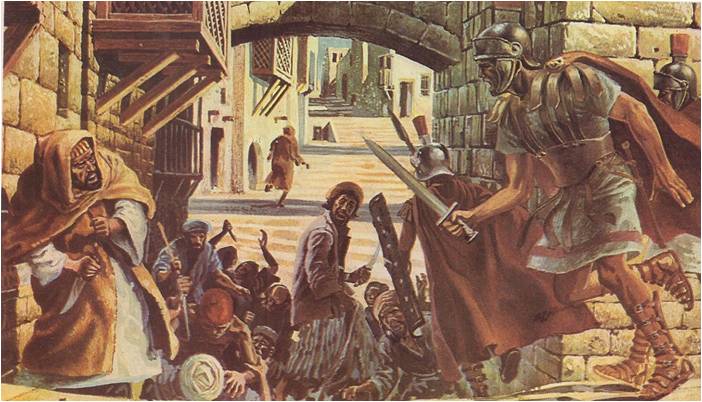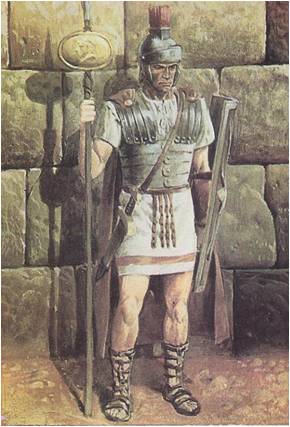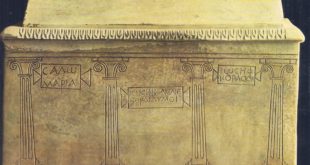IT WAS the Sunday before Passover. The soft greens of spring and patches of wild flowers brightened the hills above Jerusalem. The holy days of the Passover, celebrating the escape of the Jews from slavery in Egypt, would not begin until the following Friday at sundown. But people were already busy preparing for it.
The roads leading into the Holy City were crowded with Jews coming to attend the rites in the Temple. On the roads were also herds of cattle, flocks of sheep and carts loaded with cages of turtledoves. These were being brought to the Temple to be sold for sacrifice on the altar of God. Each Jew, according to his ability, would make a burnt offering in thankfulness and praise to the Lord for delivering his ancestors from the hands of the Egyptians.

In Jerusalem, bakers were busy baking flat cakes of hard bread, which was known as unleavened bread because it was made without yeast. Unleavened bread was the only kind the Jews were allowed to eat during the Passover. It was a reminder that their ancestors had eaten unleavened bread during their flight from Egypt, for then there had been no time to let the dough rise before baking.
The Jews were not the only ones busy with preparations. In the great marble fortress of Antonia, Pontius Pilate, the Roman governor of Judea was regrouping his soldiers for special duty throughout the city. With hundreds of thousands of Jews expected for the Passover, a large force of guards had to be held in readiness to deal with any emergency.
Ruling over the Jews was no easy matter. They were stubborn‚ willful, independent; not at all like other conquered peoples. Palestine had been an occupied country for almost five centuries. The Jews had been conquered, in turn, by the Babylonians, the Persians and the Greeks. They had won a short period of independence under the leadership of the Maccabees. But in 63 B.C., Pompey had conquered them for the Romans and they had been a small province of the Roman Empire ever since.
It was the policy of Rome in those days to set up puppet kingdoms with native kings in occupied countries. The kings raised their own armies, collected taxes for Rome and ruled over their peoples in all local matters. However, this policy had not worked with the Jews. To keep order in Palestine, Roman soldiers had to be brought from other lands. Palestine was now divided into three parts and Pontius Pilate, a Roman, ruled over the southern part as the procurator, or governor, of Judea.
It was his duty to maintain order and to collect taxes for Rome. He left religious and local matters in the hands of the high priest and the Sanhedrin, a council of elders. The Sanhedrin also served as the supreme court, but it could not sentence anyone to death. Only Pontius Pilate himself had the power to do that. He could also remove the high priest from office, if the man became difficult to manage.
Like all Roman governors, Pilate looked down on the Jews as a backward and childish people. He had no respect for their religion. He represented the glory and might of the Roman Empire, and he wanted as little to do with the Jews as possible.
During most of the year he made his home in Caesarea on the coast of the Mediterranean. He was always in Jerusalem during the Passover to keep a close watch over the Jews. He always brought with him a large number of troops to reinforce the local garrison in the city. Tiberius, the Roman emperor, would expect him to be in the centre of things and to act quickly if there was an uprising.

Above all, Pilate wanted to make a good impression on the emperor. Unfortunately, his record as governor of Judea was not nearly as good as he might have wished. When he first took office, the standards of his troops — emblems carried on a staff — were stamped with the image of the emperor. The Jews became angry. They gathered outside his palace and demanded that the standards be changed. Pilate threatened them with death. Instead of fleeing, they bared their breasts to be slaughtered. To keep their honor and be killed seemed better to them than to surrender and live. Pilate finally had to give in and have the standards put away.
Pilate disliked the Jews more than ever. They had made him look like a weakling. He remembered how strong King Herod had been years before. Herod had burned many Jews alive for having torn the golden eagle of Rome from the top of the Temple.
Pilate was firm the next time his authority was challenged. The Jews had objected when he used Temple funds to build an aqueduct. So Pilate sent his troops into the mob armed with clubs and many Jews were killed.
There had been other incidents, too. Pilate’s rule had been marked by a whole series of riots and uprisings. There were signs of more trouble ahead, for bands of Zealots were gathering in the hills. They were Jews who hated the Romans so much that they wanted to fight them and drive them out so that Palestine could be free.
Pilate had also heard disturbing reports about a holy man from Nazareth. Some called him king of the Jews. If he and his followers came to Jerusalem for the Passover and created public disturbances, Pilate would have to use his troops to restore order.
Any disturbance during the holy week, when the city was jammed with people, would be a difficult thing to handle. Strong action could excite the people to open rebellion. On the other hand, if he failed to act when the Jews were fighting among themselves, some Jews would be killed. Then the high priest would have another excuse for complaining directly to the emperor. One more unfavorable report to the emperor, Pilate knew, might be enough to end his career as a Roman governor. So he had many good reasons for being uneasy that Sunday before Passover as the Jews came streaming into the city. He sent out spies to mingle with the people and posted troops on the walls and the city gates.
“BLESSED BE THE KING”
The guards stood watch as the Jews came from every direction. They came on foot, on donkeys, on camels. They came from Jewish settlements in Asia Minor, in Egypt and in Babylon, for the Jews had scattered to many different lands during the centuries of war and rebellion. Many came by ship. They landed at Joppa or Caesarea on the Mediterranean and continued from there by land. Others traveled overland, camping at night by the side of the road. Their tents and those of thousands of other pilgrims would soon form a great tent city on the hills beyond the great walls of Jerusalem. The Holy City was still the centre of their religious world. All Jews wanted to celebrate the Passover at the Temple whenever possible and so there was nothing unusual about the crowds making their way to the Holy City on this mild spring Sunday.
Then late in the afternoon, on the road winding down from the Mount of Olives, a strange sight came into view. Leading a joyful procession was a bearded man on a donkey. Some of his party ran ahead, throwing garlands of flowers, olive branches, palm fronds and even their robes on the road in front of him.
His followers shouted with joy and waved palm fronds. They cried out, “Blessed be the King who comes in the name of the Lord! Peace in heaven and glory in the highest!”
As the procession entered the narrow streets of the city, there were people in Jerusalem who recognized the man on the donkey. He was Jesus of Nazareth, the man from Galilee who was called a prophet and a worker of miracles. It was said that he went about the countryside preaching and healing the sick and giving sight to the blind. It was also said that he had recently brought back to life a man named Lazarus, who had been dead and buried for several days.
Those who were curious and those who wished to believe in miracles joined his followers. More and more fell in with the procession as it moved through the streets. By the time it reached the Temple it was a huge mob and the Temple priests were frightened. They had tried to arrest this Jesus on his last visit several months before, but he had escaped and fled from the city. Now he was back, bold, unafraid and all Jerusalem seemed to be at his heels.
The priests watched as he and his followers entered the Temple. They could do nothing. Any attempt to arrest him would surely set off a riot and any violence within the Temple would bring in the hated Roman guards. Yet something had to be done, for these were dangerous times.
No one knew that better than Caiphas, the high priest. As the religious leader of the Jews, he was the ruler of the Temple. The Jews looked up to him as their political leader as well. Under him, they enjoyed religious freedom and managed their local affairs with little interference from their Roman masters.
A CONQUERED PEOPLE
They were never allowed to forget that they were a conquered people. They were reminded of it whenever the Romans hounded them for tax money. They were reminded of it whenever Jews were burned alive or crucified. They were reminded of it every time they saw a Roman soldier with his red cloak, his helmet and his gleaming spear. So much did the Jews hate the Romans that they lived for the day when they could have their revenge. Caiphas knew that when people were filled with hate they became difficult to control. It worried him, for as the political leader of the Jews it was his duty to see that they lived in peace. If he failed to keep order, the Romans would remove him from office and put someone else in his place.
Danger of violence was always much greater during the Passover. It was a festival of freedom and it made the people all the more bitter toward their Roman masters. Caiphas could well remember the riots of other Passovers. Not many years before, a rebellion had broken out and the Romans had massacred three thousand Jews in the court of the Temple.

The presence of Jesus and his followers could only make things worse. All Jerusalem was talking about his latest miracle, which had something to do with raising a man from the dead. Caiphas was not impressed. Such tricks had been cleverly staged before. But many people believed in the man and his miracles. Thousands had joined his procession as it marched through the streets of the city.
To Caiphas, there was nothing mysterious about all this. He understood his people. They were different. Other peoples of the empire had many false gods, but the Jews worshiped only the one true God of the universe. They were his Chosen People. He had chosen them to spread the true religion to all the world. Since they were his people, God had often saved them by miracles in the past. Now they expected God to help them throw off the yoke of their Roman masters.
They believed God would send them a leader to set them free, to establish peace and to bring on a golden age that would last forever. The prophets had often mentioned the coming of such a leader, calling him the Messiah, the Anointed One. The Anointed One suggested a king, for kings were anointed with oil when they were crowned. The people, therefore, awaited the coming of a king who would lead them against the Romans.
Many Jews hoped Jesus was the promised king, for his miracles seemed to prove that he was truly the Lord’s Anointed. Caiphas considered Jesus merely another trouble-maker. There had been others like him: Judas, Simon and Athronges, for example. Each had stirred up the people and led unsuccessful rebellions against the Romans. People were easily fooled by such men. Now this Jesus was becoming bolder as his following grew larger day by day. A few more of his staged miracles might be enough to win over the entire population.
Caiphas knew the time had come for action. He summoned his advisors to meet with him to consider the matter. Something had to be done to stop this worker of miracles before it was too late. How could he be taken without stirring up the people?
All over Jerusalem that Sunday, people were talking and wondering about the strange procession that had entered the Holy City. Centuries later, that day became known throughout the world as the first Palm Sunday. The year was probably A.D. 29.





